人教版七年级上册 Unit 5 Do you have a soccer ball?Section A (GF-3c) 课件 (共32张PPT)
文档属性
| 名称 | 人教版七年级上册 Unit 5 Do you have a soccer ball?Section A (GF-3c) 课件 (共32张PPT) | 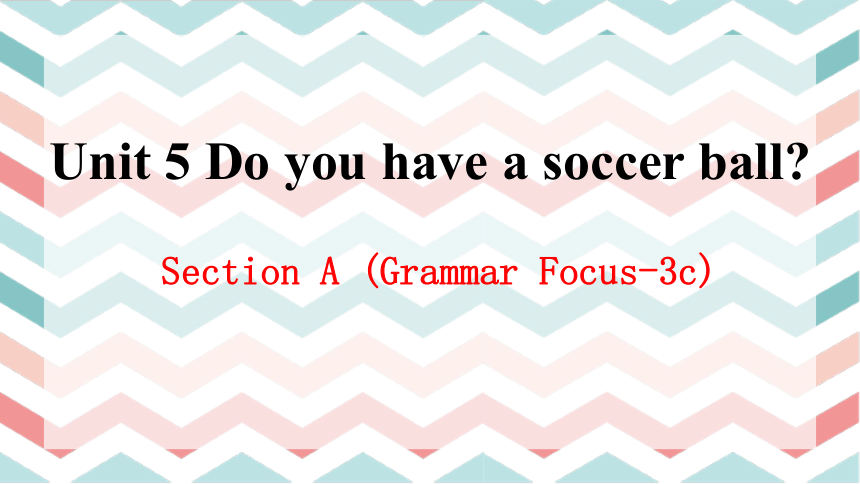 | |
| 格式 | pptx | ||
| 文件大小 | 2.8MB | ||
| 资源类型 | 教案 | ||
| 版本资源 | 人教新目标(Go for it)版 | ||
| 科目 | 英语 | ||
| 更新时间 | 2022-10-26 22:18:46 | ||
图片预览

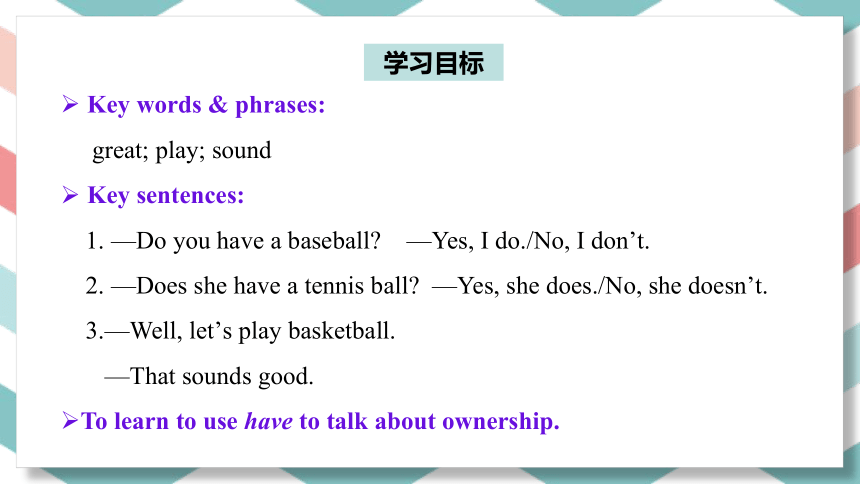
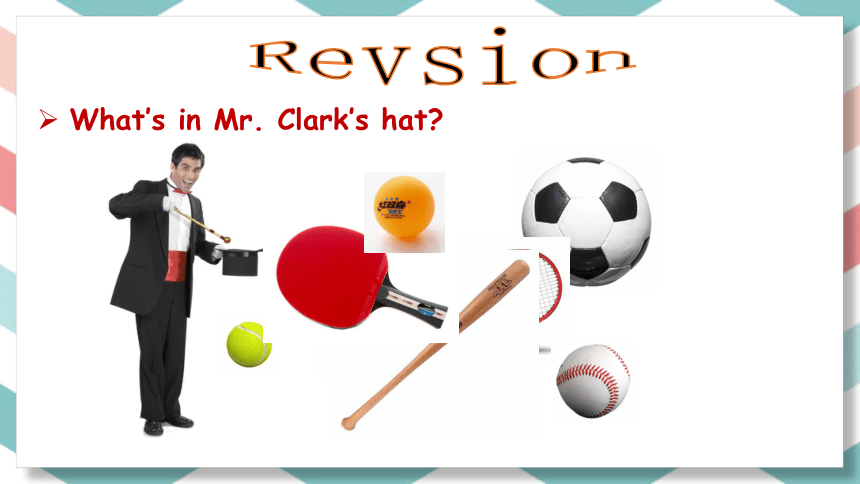
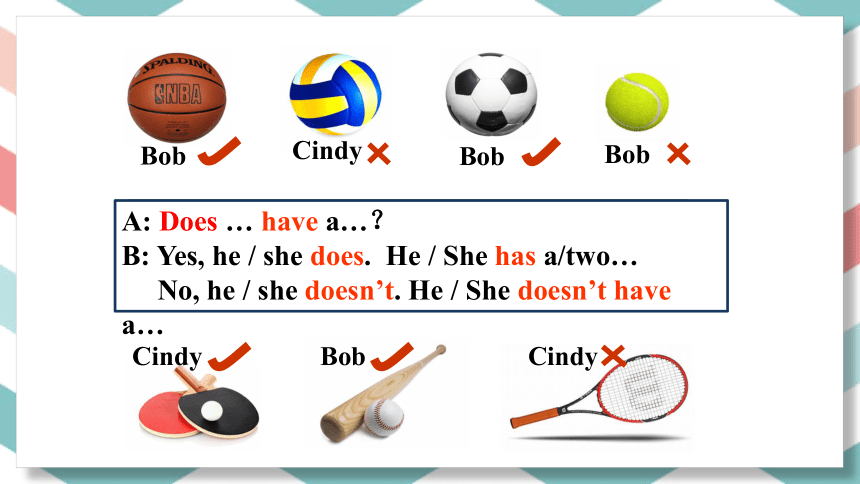
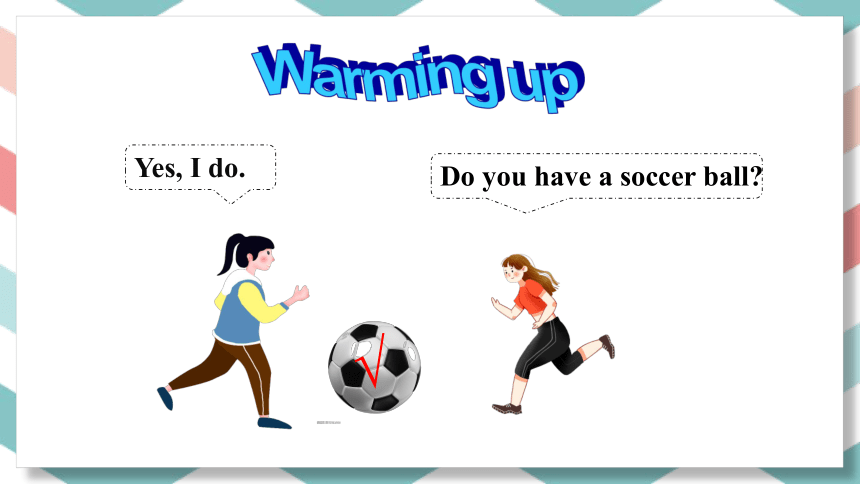
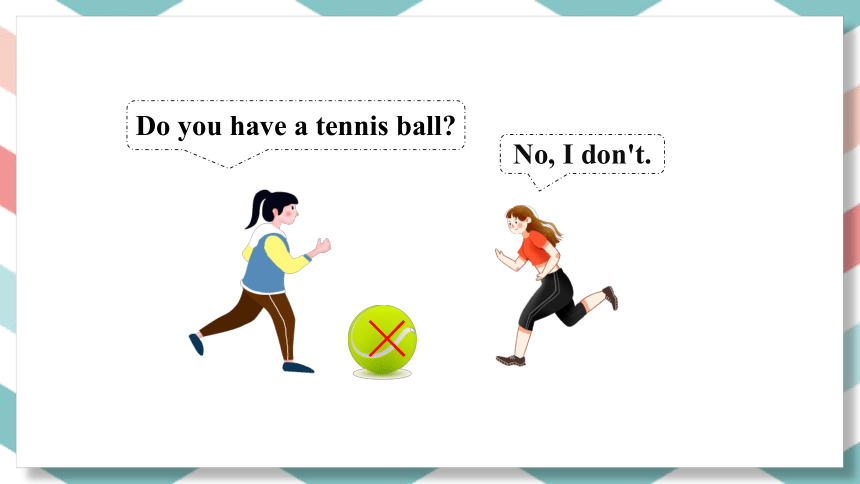
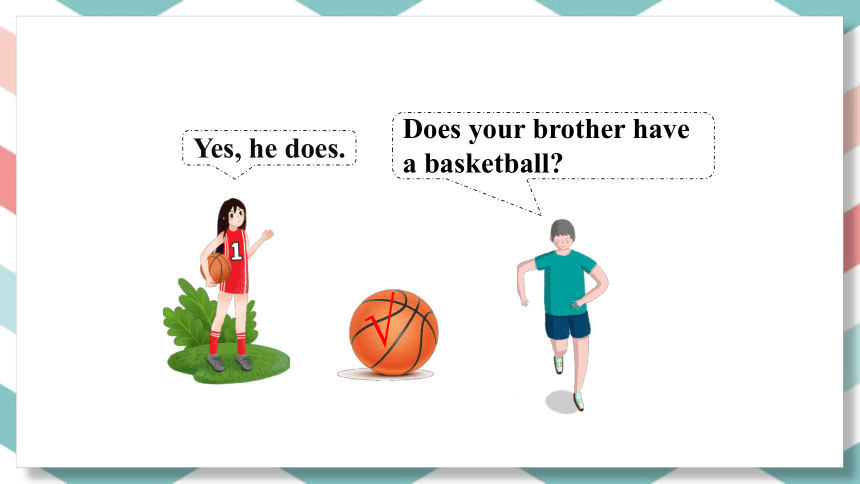
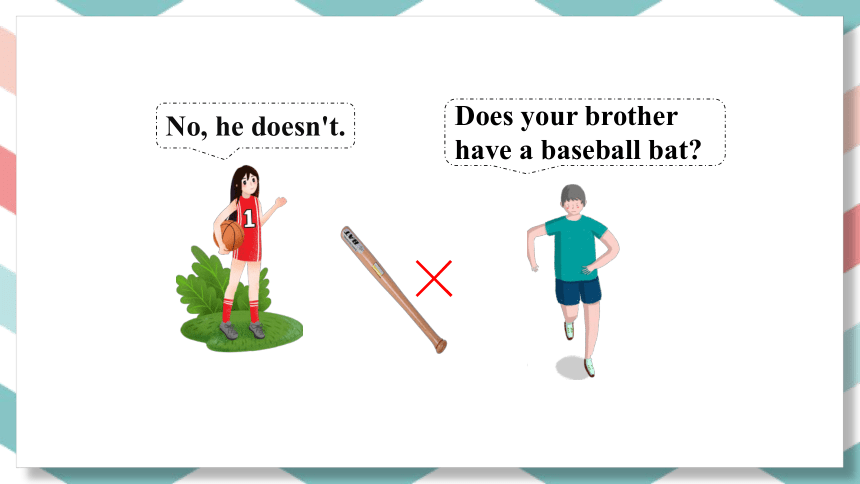
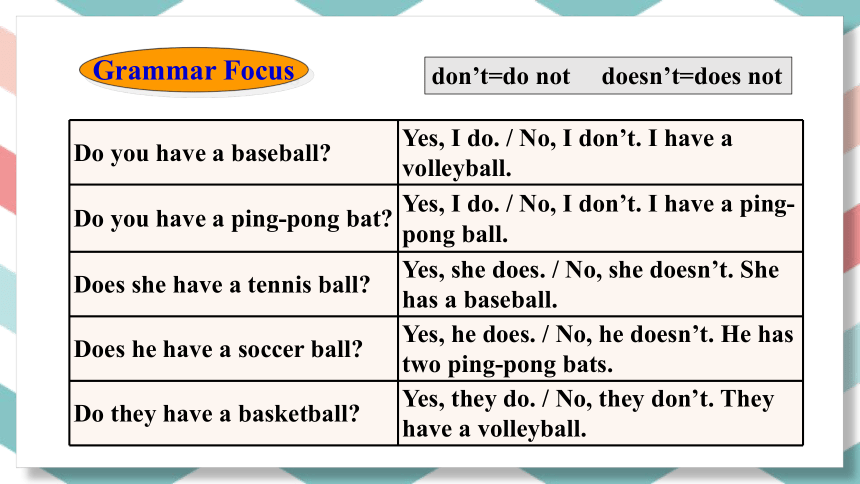
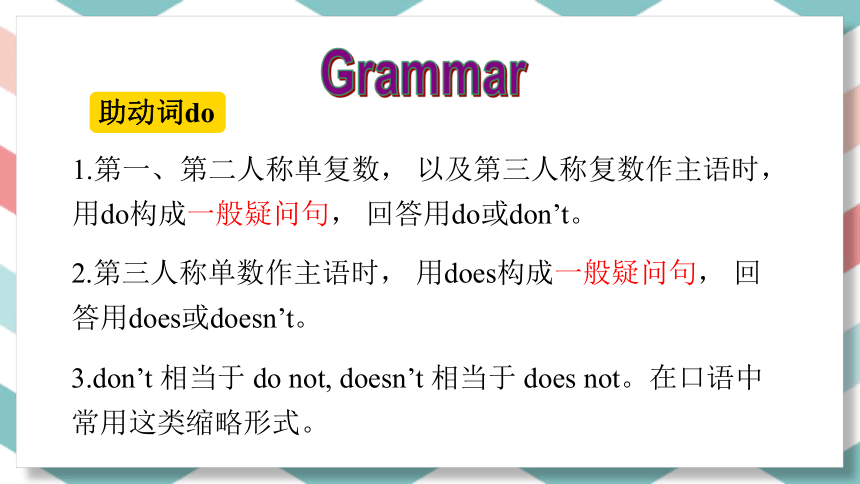
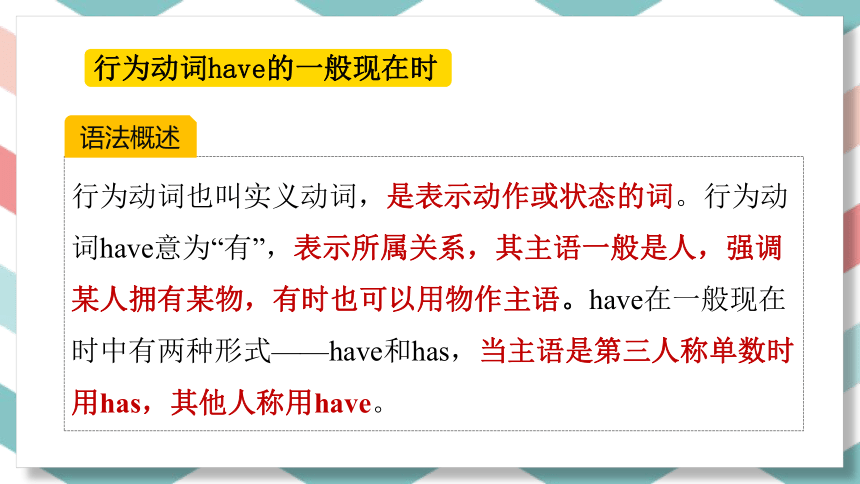
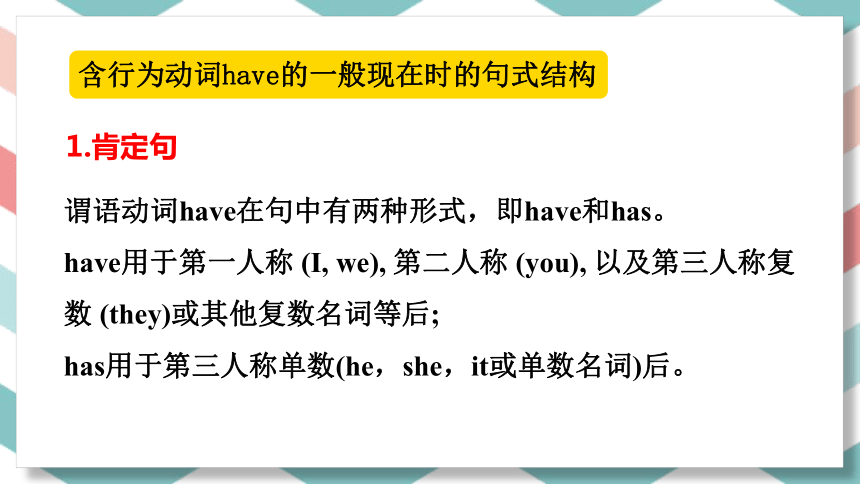
文档简介
(共32张PPT)
Section A (Grammar Focus-3c)
Unit 5 Do you have a soccer ball
Key words & phrases:
great; play; sound
Key sentences:
1. —Do you have a baseball —Yes, I do./No, I don’t.
2. —Does she have a tennis ball —Yes, she does./No, she doesn’t.
3.—Well, let’s play basketball.
—That sounds good.
To learn to use have to talk about ownership.
学习目标
What’s in Mr. Clark’s hat
Revsion
Cindy
A: Do you have a…?
B: Yes, I do. I have a/two …
No, I don’t. I don’t have a…
A: Does … have a…?
B: Yes, he / she does. He / She has a/two…
No, he / she doesn’t. He / She doesn’t have a…
Bob
Bob
Bob
Bob
Cindy
Cindy
Warming up
Do you have a soccer ball
Yes, I do.
√
Do you have a tennis ball
No, I don't.
×
Does your brother have a basketball
Yes, he does.
√
Does your brother have a baseball bat
No, he doesn't.
×
Grammar Focus
Do you have a baseball Yes, I do. / No, I don’t. I have a volleyball.
Do you have a ping-pong bat Yes, I do. / No, I don’t. I have a ping-pong ball.
Does she have a tennis ball Yes, she does. / No, she doesn’t. She has a baseball.
Does he have a soccer ball Yes, he does. / No, he doesn’t. He has two ping-pong bats.
Do they have a basketball Yes, they do. / No, they don’t. They have a volleyball.
don’t=do not doesn’t=does not
Grammar
助动词do
1.第一、第二人称单复数, 以及第三人称复数作主语时, 用do构成一般疑问句, 回答用do或don’t。
2.第三人称单数作主语时, 用does构成一般疑问句, 回答用does或doesn’t。
3.don’t 相当于 do not, doesn’t 相当于 does not。在口语中常用这类缩略形式。
行为动词也叫实义动词,是表示动作或状态的词。行为动词have意为“有”,表示所属关系,其主语一般是人,强调某人拥有某物,有时也可以用物作主语。have在一般现在时中有两种形式——have和has,当主语是第三人称单数时用has,其他人称用have。
行为动词have的一般现在时
语法概述
含行为动词have的一般现在时的句式结构
谓语动词have在句中有两种形式,即have和has。
have用于第一人称 (I, we), 第二人称 (you), 以及第三人称复数 (they)或其他复数名词等后;
has用于第三人称单数(he,she,it或单数名词)后。
1.肯定句
e.g:
I have a baseball. 我有一个棒球。
They have some good friends. 他们有一些好朋友。
Tom has a Chinese friend. 汤姆有一位中国朋友。
The school has three grades. 这所学校有三个年级。
变否定句时,需要借助助动词do或 does 的否定形式。
主语为非第三人称单数时, 句型为:主语+don’t have...
e.g: I don’t have a baseball. 我没有棒球。
主语为第三人称单数时, 句型为:主语+doesn’t have...
e.g: My sister doesn’t have a watch. 我的妹妹没有手表。
2.否定句
变一般疑问句时,也需要借助助动词do或其第三人称单数形式does。
主语为非第三人称单数时,句型为:Do+主语+have...
主语为第三人称单数时,句型为:Does+主语+have...
肯定回答: Yes, 主语+do / does.
否定回答: No, 主语+don’t / doesn’t.
3.一般疑问句
e.g:
—Do you have a basketball 你有篮球吗?
— Yes, I do. / No, I don’t.
是的,我有。/ 不,我没有。
— Does he have a tennis racket 他有一个网球拍吗?
— Yes, he does. / No, he doesn’t.
是的,他有。/ 不,他没有。
数 人称 汉语 主格 助动词
单数 第一人称 我 I
第二人称 你 you
第三人称 他 he
她 she
它 it
复数 第一人称 我们 we
第二人称 你们 you
第三人称 他/她/它们 they
do
does
do
英语句子里的人称和数
注:除了he/she/it之外,单独的一个人/物(I/you除外),也属于第三人称单数,对应的助动词也用does。
My father doesn’t have a car.
我爸爸没有小汽车。
Does the dog have a name
这条狗有名字吗?
3a
Write each word in the correct place in the chart.
I he they you
we she it Eric
do does
I
he
they
you
we
she
it
Eric
3b
Fill in the blanks with do or does. Then practice the
conversations with your partner.
A: you have a baseball
B: Yes, I .
A: Great! I have a bat. Let’s play!
Conversation 1
Do
do
A: _______ John have a soccer ball
B: No, he _______.
A: _______ he have a ping-pong bat
B: Yes, he _______. I think he has a ping-pong ball, too.
A: Hmm…let’s ask.
Conversation 2
Does
doesn’t
Does
does
A: _____ your friends have a basketball
B: Yes, they ______ . They have two basketballs.
A: Well, let’s play basketball.
B: That sounds good.
Conversation 3
Do
do
主语+系动词+表语
那听起来不错。
3c
Remember the things in Bob’s room. Then close your books and ask and answer questions with a partner.
A: Does Bob have a soccer ball
B: Yes, he does.
Make conversations with your partner. Talk about the pictures below.
A: Let’s play soccer.
B: I don’t have a soccer ball.
A: Well, let’s play volleyball.
B: That sounds good.
Language Points
1. Great! I have a bat. (教材P27 3b)
great adj. 美妙的;伟大的
great独立成句,常用于口语中,表示说话人的喜悦之情,通常意为“太好了”。
Lu Xun is a great writer. 鲁迅是一位伟大的作家。
—I get a ticket to the show. 我得到了一张演出的票。
—Great! 太棒了!
2. Well, let’s play basketball. (教材P27 3b)
play v.参加(比赛或运动); 玩耍
1) play在此处是及物动词,后接表示球类运动的名词时,play 与球类运动名词之间不加冠词。
2) play作动词还可意为 “玩耍”,play with sb./sth.表示“和某人一起玩/玩……”。
3) play作动词,还可意为“演奏;弹奏” ,后接表示乐器的名词时,乐器名词前要加定冠词the。
He often plays volleyball after school. 他放学后经常打排球。
I often play with Tom. We usually play with a ball. 我经常和汤姆玩。我们通常玩球。
She can play the piano. 她会弹钢琴。
3. That sounds good. (教材P27 3b)
sound v.听起来好像
sound在此处作连系动词, 也是感观动词,后常接形容词作表语。
That sounds interesting. 那听起来很有趣。
常见的感观动词:
Exercises
一、根据句意及汉语提示完成句子,每空一词。
1. Do you have a ________(棒球)?
2. Nick ______(有)a new ping-pong bat.
3. We _______(有)a volleyball.
4. That _______(听起来)great.
5. Let’s _______ ___________(打篮球)with Mike.
baseball
has
have
sounds
play basketball
1. — _____ you have a volleyball
— No, I _____. But my sister _____ a new one.
A. Do, don’t, have B. Do, don’t, has
C. Does, doesn’t, have D. Does, doesn’t, has
2. — _____ Anna _____ a ping-pong bat — Yes, she _____.
A. Do, have, do B. Does, have, does
C. Do, have, has D. Does, have, has
二、单项选择。
B
B
三、按要求完成下列各题。
1. They have a basketball.(变否定句)
___________________________________
2. Lily has a ping-pong ball.(变一般疑问句)
___________________________________
3. Do they have a volleyball (作否定回答)
___________________________________
They don’t have a basketball.
Does Lily have a ping-pong ball
No, they don’t.
Homework
Preview the new words and phrases in Section B(1a-1d).
Do the exercises in students’ book.
Section A (Grammar Focus-3c)
Unit 5 Do you have a soccer ball
Key words & phrases:
great; play; sound
Key sentences:
1. —Do you have a baseball —Yes, I do./No, I don’t.
2. —Does she have a tennis ball —Yes, she does./No, she doesn’t.
3.—Well, let’s play basketball.
—That sounds good.
To learn to use have to talk about ownership.
学习目标
What’s in Mr. Clark’s hat
Revsion
Cindy
A: Do you have a…?
B: Yes, I do. I have a/two …
No, I don’t. I don’t have a…
A: Does … have a…?
B: Yes, he / she does. He / She has a/two…
No, he / she doesn’t. He / She doesn’t have a…
Bob
Bob
Bob
Bob
Cindy
Cindy
Warming up
Do you have a soccer ball
Yes, I do.
√
Do you have a tennis ball
No, I don't.
×
Does your brother have a basketball
Yes, he does.
√
Does your brother have a baseball bat
No, he doesn't.
×
Grammar Focus
Do you have a baseball Yes, I do. / No, I don’t. I have a volleyball.
Do you have a ping-pong bat Yes, I do. / No, I don’t. I have a ping-pong ball.
Does she have a tennis ball Yes, she does. / No, she doesn’t. She has a baseball.
Does he have a soccer ball Yes, he does. / No, he doesn’t. He has two ping-pong bats.
Do they have a basketball Yes, they do. / No, they don’t. They have a volleyball.
don’t=do not doesn’t=does not
Grammar
助动词do
1.第一、第二人称单复数, 以及第三人称复数作主语时, 用do构成一般疑问句, 回答用do或don’t。
2.第三人称单数作主语时, 用does构成一般疑问句, 回答用does或doesn’t。
3.don’t 相当于 do not, doesn’t 相当于 does not。在口语中常用这类缩略形式。
行为动词也叫实义动词,是表示动作或状态的词。行为动词have意为“有”,表示所属关系,其主语一般是人,强调某人拥有某物,有时也可以用物作主语。have在一般现在时中有两种形式——have和has,当主语是第三人称单数时用has,其他人称用have。
行为动词have的一般现在时
语法概述
含行为动词have的一般现在时的句式结构
谓语动词have在句中有两种形式,即have和has。
have用于第一人称 (I, we), 第二人称 (you), 以及第三人称复数 (they)或其他复数名词等后;
has用于第三人称单数(he,she,it或单数名词)后。
1.肯定句
e.g:
I have a baseball. 我有一个棒球。
They have some good friends. 他们有一些好朋友。
Tom has a Chinese friend. 汤姆有一位中国朋友。
The school has three grades. 这所学校有三个年级。
变否定句时,需要借助助动词do或 does 的否定形式。
主语为非第三人称单数时, 句型为:主语+don’t have...
e.g: I don’t have a baseball. 我没有棒球。
主语为第三人称单数时, 句型为:主语+doesn’t have...
e.g: My sister doesn’t have a watch. 我的妹妹没有手表。
2.否定句
变一般疑问句时,也需要借助助动词do或其第三人称单数形式does。
主语为非第三人称单数时,句型为:Do+主语+have...
主语为第三人称单数时,句型为:Does+主语+have...
肯定回答: Yes, 主语+do / does.
否定回答: No, 主语+don’t / doesn’t.
3.一般疑问句
e.g:
—Do you have a basketball 你有篮球吗?
— Yes, I do. / No, I don’t.
是的,我有。/ 不,我没有。
— Does he have a tennis racket 他有一个网球拍吗?
— Yes, he does. / No, he doesn’t.
是的,他有。/ 不,他没有。
数 人称 汉语 主格 助动词
单数 第一人称 我 I
第二人称 你 you
第三人称 他 he
她 she
它 it
复数 第一人称 我们 we
第二人称 你们 you
第三人称 他/她/它们 they
do
does
do
英语句子里的人称和数
注:除了he/she/it之外,单独的一个人/物(I/you除外),也属于第三人称单数,对应的助动词也用does。
My father doesn’t have a car.
我爸爸没有小汽车。
Does the dog have a name
这条狗有名字吗?
3a
Write each word in the correct place in the chart.
I he they you
we she it Eric
do does
I
he
they
you
we
she
it
Eric
3b
Fill in the blanks with do or does. Then practice the
conversations with your partner.
A: you have a baseball
B: Yes, I .
A: Great! I have a bat. Let’s play!
Conversation 1
Do
do
A: _______ John have a soccer ball
B: No, he _______.
A: _______ he have a ping-pong bat
B: Yes, he _______. I think he has a ping-pong ball, too.
A: Hmm…let’s ask.
Conversation 2
Does
doesn’t
Does
does
A: _____ your friends have a basketball
B: Yes, they ______ . They have two basketballs.
A: Well, let’s play basketball.
B: That sounds good.
Conversation 3
Do
do
主语+系动词+表语
那听起来不错。
3c
Remember the things in Bob’s room. Then close your books and ask and answer questions with a partner.
A: Does Bob have a soccer ball
B: Yes, he does.
Make conversations with your partner. Talk about the pictures below.
A: Let’s play soccer.
B: I don’t have a soccer ball.
A: Well, let’s play volleyball.
B: That sounds good.
Language Points
1. Great! I have a bat. (教材P27 3b)
great adj. 美妙的;伟大的
great独立成句,常用于口语中,表示说话人的喜悦之情,通常意为“太好了”。
Lu Xun is a great writer. 鲁迅是一位伟大的作家。
—I get a ticket to the show. 我得到了一张演出的票。
—Great! 太棒了!
2. Well, let’s play basketball. (教材P27 3b)
play v.参加(比赛或运动); 玩耍
1) play在此处是及物动词,后接表示球类运动的名词时,play 与球类运动名词之间不加冠词。
2) play作动词还可意为 “玩耍”,play with sb./sth.表示“和某人一起玩/玩……”。
3) play作动词,还可意为“演奏;弹奏” ,后接表示乐器的名词时,乐器名词前要加定冠词the。
He often plays volleyball after school. 他放学后经常打排球。
I often play with Tom. We usually play with a ball. 我经常和汤姆玩。我们通常玩球。
She can play the piano. 她会弹钢琴。
3. That sounds good. (教材P27 3b)
sound v.听起来好像
sound在此处作连系动词, 也是感观动词,后常接形容词作表语。
That sounds interesting. 那听起来很有趣。
常见的感观动词:
Exercises
一、根据句意及汉语提示完成句子,每空一词。
1. Do you have a ________(棒球)?
2. Nick ______(有)a new ping-pong bat.
3. We _______(有)a volleyball.
4. That _______(听起来)great.
5. Let’s _______ ___________(打篮球)with Mike.
baseball
has
have
sounds
play basketball
1. — _____ you have a volleyball
— No, I _____. But my sister _____ a new one.
A. Do, don’t, have B. Do, don’t, has
C. Does, doesn’t, have D. Does, doesn’t, has
2. — _____ Anna _____ a ping-pong bat — Yes, she _____.
A. Do, have, do B. Does, have, does
C. Do, have, has D. Does, have, has
二、单项选择。
B
B
三、按要求完成下列各题。
1. They have a basketball.(变否定句)
___________________________________
2. Lily has a ping-pong ball.(变一般疑问句)
___________________________________
3. Do they have a volleyball (作否定回答)
___________________________________
They don’t have a basketball.
Does Lily have a ping-pong ball
No, they don’t.
Homework
Preview the new words and phrases in Section B(1a-1d).
Do the exercises in students’ book.
同课章节目录
- starters 预备篇(2012秋审查)
- Unit 1 Good morning !
- Unit 2 What’s this in English?
- Unit 3 What color is it ?
- Unit 1 My name's Gina.
- Section A
- Section B
- Unit 2 This is my sister.
- Section A
- Section B
- Unit 3 Is this your pencil?
- Section A
- Section B
- Unit 4 Where's my schoolbag?
- Section A
- Section B
- Unit 5 Do you have a soccer ball?
- Section A
- Section B
- Unit 6 Do you like bananas?
- Section A
- Section B
- Unit 7 How much are these socks?
- Section A
- Section B
- Unit 8 When is your birthday?
- Section A
- Section B
- Unit 9 My favorite subject is science.
- Section A
- Section B
